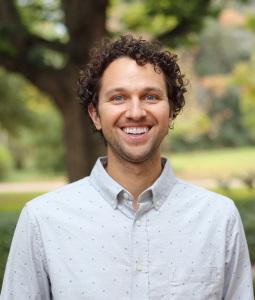Department of Psychology
Faculty and Staff Directory
Dan Cooper
| Title: | Assistant Professor |
| Department: | Psychology McCausland College of Arts and Sciences |
| Email: | dc47@mailbox.sc.edu |

Background
Daniel Cooper is an Assistant Professor in the Department of Psychology at the University of South Carolina. He is also affiliated with the Research Center for Child Well-Being, a newly funded research center with the mission to reduce mental and physical health problems for children ages 2-10. He received his Ph.D. in Family Social Science with a specialization in Couple and Family Therapy and Prevention Science from the University of Minnesota. Throughout his doctoral studies, he was funded by the AAMFT Minority Fellowship Program. He completed a T32 postdoctoral fellowship in the Prevention and Methodology Training Program at Penn State University.
Research
My passion for engaging in research with historically underrepresented and marginalized children has come from a variety of personal and work-related experiences interacting with families of diverse backgrounds. Growing up as a biracial (Black-White) boy in the U.S., I learned first-hand about the underlying challenges that can come from navigating multiple racial identities and the distress that racism can cause for people of color. My experiences in graduate school providing psychotherapy to trauma-affected Latinx immigrant families heightened my awareness of the impact of PTSD and cultural stress on family functioning. Motivated by these experiences, my mission is to use innovative methods to improve the mental health and resilience of minoritized children affected by adversity (e.g., racism, traumatic events). This research is important because minoritized populations (e.g., Black, Indigenous, people of color) are often disproportionately affected by adversity and are often less likely to seek out mental health services when they need it. Specifically, my program of research focuses on (a) using secondary data analysis to identify malleable risk and protective factors that can be targeted using prevention interventions and (b) evaluating the implementation of family-based prevention programs for minoritized children exposed to adversity. I am also beginning a new line of research that will focus on creating integrated prevention programs to jointly prevent child physical and mental health problems. Ultimately, I hope that through the course of my career my research will help decrease mental health disparities and improve resilience for minoritized children experiencing adversity.
Here are several projects I am currently working on:
Understanding parenting strengths and challenges to inform a parenting intervention to promote the physical and emotional health of Black and Latinx children. This qualitative study involves interviewing parents and community health workers to identify parenting needs and determine how to best address these needs to promote children’s health using family-based prevention efforts. This study will inform a parenting intervention to improve child and family health.
A scoping review of parenting interventions with a dual focus on promoting child social-emotional functioning and healthy lifestyle behaviors (e.g., sleep, diet, physical activity). Following PRISMA guidelines for conducing scoping reviews, we will search published literature between 2002-2022 using various online databases (e.g., PubMed, PsychINFO). Results will identify the intervention components used to impact social-emotional and healthy lifestyle behavior, the types of outcomes assessed, the extent to which equity was considered, and identify areas for further study.
Testing the differential treatment effects of a preventive intervention for families experiencing high levels of economic distress. This project examines whether certain types or combinations of pre-existing risk factors, such as intimate partner violence and job instability, impacted participants’ responses to the family-based intervention.
Determining whether having organizational support influences the implementation of a trauma-informed family intervention. This study uses a combination of clinical and administrative data from the Early Childhood Trauma Study to test the hypothesis that higher levels of organizational support will be associated with greater fidelity and treatment gains.
Plans for Future Research. My long-term goal is to improve the effectiveness, sustainment, and scalability of family-based prevention programs for minoritized children to promote resilience to adversity and address the Healthy People 2030’s initiative to strengthen the health and well-being of all people. I plan to work directly with communities to accommodate the growing need for the implementation and dissemination of culturally sensitive preventive interventions for underserved families. I intend to pursue this goal by (a) conducting studies evaluating family-based prevention efforts and (b) testing implementation strategies to improve the delivery of preventive family-based interventions for children experiencing adversity.
Follow me on Twitter @dcoop1124 for updates on my research!
Representative Publications
Cooper, D. K., Bámaca-Colbert, M., Layland, E. K., Simpson, E. G., & Bayly, B.L. (2021). Puerto Ricans and Mexican immigrants differ in their psychological responses to patterns of lifetime adversity. PLoS ONE, 16(10): e0258324. https://doi.org/10.1371/journal.pone.0258324
Cooper, D. K., Erolin, K. S., Wieling, E., Durtschi, J., Aguilar, E., Diaspro-Higuera, M. O., & Garcia-Huidobro, D. (2020). Family violence, PTSD, and parent-child interactions: Dyadic data analysis with Mexican families. Child & Youth Care Forum, 49, 915-940. https://doi.org/10.1007/s10566-020-09564-3
Cooper, D. K., Bachem, R., Meentken, M. G., Aceves, L., & Perez Barrios, A. G. (2020). Cumulative lifetime adversity and depression among a national sample of U.S. Latinx immigrants: Within-group differences in risk and protective factors using data form the HCHS/SOL Sociocultural Ancillary Study. Journal of Latinx Psychology, 8(3), 202-220. https://doi.org/10.1037/lat0000145
Cooper, D. K., Wieling, E., Domenech-Rodriguez, M., Garcia-Huidobro, D., Baumann, A., Mejia, A., Le, H., Cardemil, E., & Acevedo-Polakovich, I. G. (2020). Latinx mental health scholars’ experiences with cultural adaptation and implementation of systemic family interventions. Family Process, 59(2), 492-508. https://doi.org/10.1111/famp.12433
Cooper, D. K., Wieling, E., & Pfeiffer, A. (2019). Bioecological implications of narrative exposure therapy in low-resource settings: Individual, family, community, and socio-political contexts. Australian and New Zealand Journal of Family Therapy, 40(4), 353-367. https://doi.org/10.1002/anzf.1392